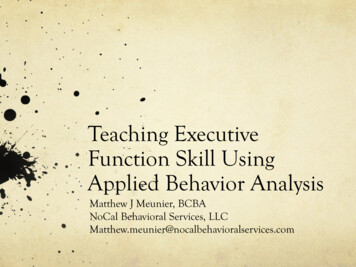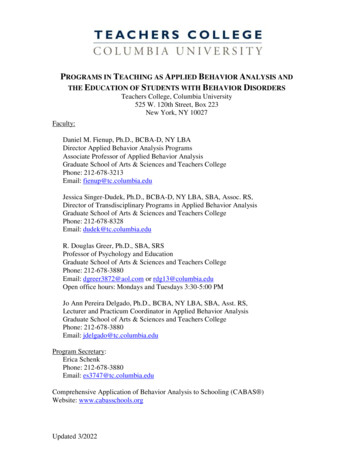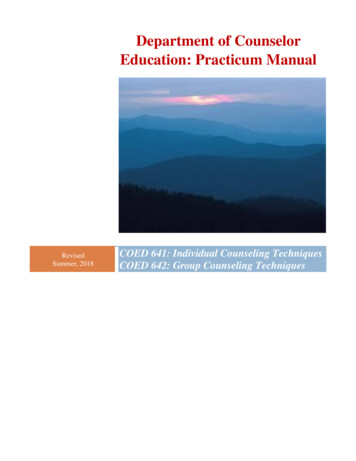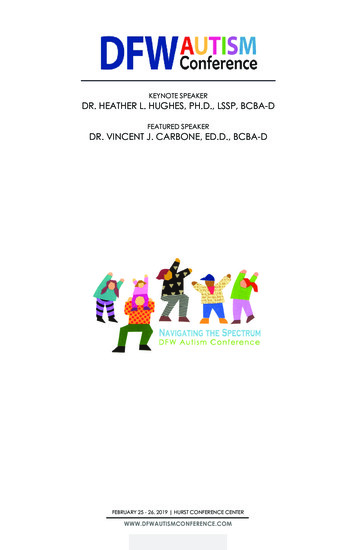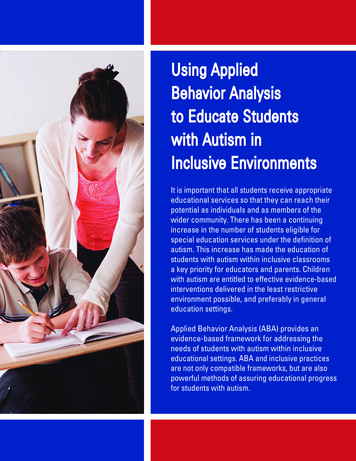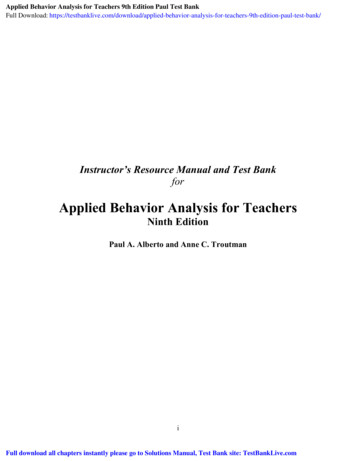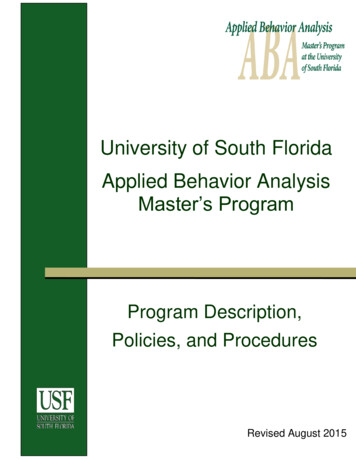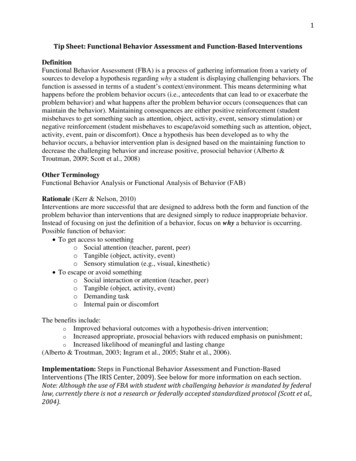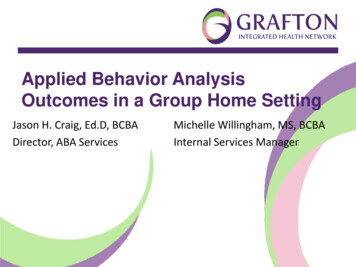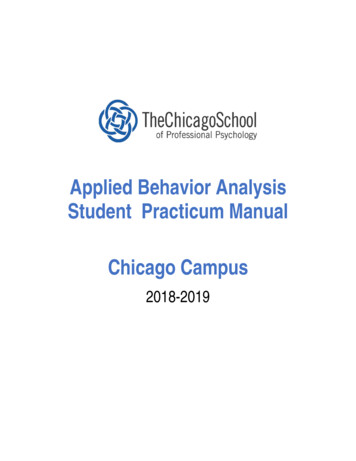
Transcription
Applied Behavior AnalysisStudent Practicum ManualChicago Campus2018-2019
TCSPP Student Practicum Manual2018-20192IMPORTANT LINKSTCSPP ABA Practicum WebsiteFind descriptions of sites, useful documents, links, and updates here.www.tcsppABA.webs.comTime2TrackBeginning and end-of-semester paperwork must be completed on this database.https://time2track.com/Behavior Analyst Certification BoardBACB requirements and updates regarding practicum are located here.http://www.bacb.com/Updated October 1, 2018
TCSPP Student Practicum Manual2018-2019CONTACT INFROMATIONDirector of Clinical Training, ABA DepartmentCam Mittelman, MA, ir, ABA DepartmentAshley Whittington-Barnish, Ph.D, BCBA-D, iate Chair, ABA DepartmentKaius Ward, MA, r, Office of Placement and Training, Chicago CampusMegan Pietrucha, ational Manager of APP Student Records and DataJames Vowell, BAS ITAMJVowell@thechicagoschool.eduUpdated October 1, 20183
TCSPP Student Practicum Manual2018-2019Dear ABA Practicum Student:Congratulations on beginning your ABA Practicum Experience! Practicum is the field-basedexperience for graduate students. It is where you receive the close supervision and feedbackneeded to begin to develop the professional repertoire of a behavior analyst.The Chicago School uses the Engaged Professional Model and believes that quality practicum/internshiptraining is essential to the process of becoming a competent practitioner of applied behavior analysis.The Department of Applied Behavior Analysis is committed to serving the mission and philosophy of TheChicago School by: Providing support, guidance, and mentoring to students, faculty, and site supervisors around allaspects of professional training. Developing and maintaining high quality training sites for students. Creating opportunities for students to aid underserved, diverse populations, and the localcommunity. Using progressive assessment strategies to evaluate and subsequently improve studentperformance and learning at their training sites. Coordinating and overseeing the placement of all students seeking to fulfill the trainingrequirements of their academic programs.The ABA practicum experience fulfills your TCSPP Master’s Degree requirements as well as therequirements of the Behavior Analyst Certification Board Experience Standards.Sincerely,Cam Mittelman, MA, BCBADirector of Clinical TrainingDepartment of Applied Behavior Analysiscmittelman@thechicaogscshool.eduUpdated October 1, 20184
TCSPP Student Practicum Manual2018-20195WHAT IS PRACTICUM?Practicum is a field-based course of study that involves supported practical application of the behavioranalytic skills you learn in class. It is meant to prepare you to become a behavior analytic practitioner orclinician. Practicum experiences vary in both setting and client demographic. Most TCSPP ABA practicumsites provide experiences working with individuals (both children and adults) with intellectual ordevelopmental disabilities (such as autism) and/or mental illness. However, since behavior analysis is agenerally applicable science, the skills you learn can be generalized to a variety of settings andpopulations.Master of Science in Applied Behavior AnalysisStudents pursuing a Master’s degree in Applied Behavior Analysis from the Chicago campus of TCSPPmust complete this University Approved Practicum Program to meet graduation requirements: Accrue a total of 1500 hours (or 1000 practicum weighted hours, or 750 intensive practicumweighted hours, or any combination thereof) in accordance with BACB policies. Successfully complete AB615, AB616, AB617, and AB618 and all corresponding courserequirements. If the total number of required experience hours are not completed by the end ofAB618, students must enroll in AB997 Practicum Extension until hours are completed.Post Masters BCBA CertificationStudents enrolled in the BCBA re-specialization course sequence are not required to enroll in TCSPP’sUniversity Approved Practicum Program; instead, they can meet BACB experience requirements bycompleting Supervised Independent Fieldwork on their own. A comparison of the two experience types canbe found here on the BACB website.Re-specialization students choosing to accrue practicum hours (as opposed to supervised independentfieldwork hours) should meet with Cam Mittelman so requirements specific to re-specialization students canbe discussed. Re-specialization students who choose to complete their experience hours throughTCSPP’s University Approved Practicum Program are responsible for all policies and proceduresoutlined in this manual unless exceptions are noted.The Chicago Campus ABA Department uses a “tiered” approach to training, with practicumactivities planned to complement completed and co-requisite coursework. Activities, designed topromote a well-rounded and supported training experience, begin with limited client involvementand progress toward more independent work. You can find a detailed description of thesepracticum tiers in Appendix D. You should never feel as though you are in situation that you donot know how to handle. Should this happen, please bring it to the attention of your supervisor,seminar instructor, or Cam Mittelman immediately.Updated October 1, 2018
TCSPP Student Practicum Manual2018-20196WHEN DO I START PRACTICUM?Assuming you meet pre-requisites, full-time Fall-start students typically begin practicum during theirsecond semester. Full-time Spring-start students typically start practicum their third semester. Thistable shows the pre-requisites to progress through each tier of mester 2SpringAB615FallAB615AB540 Concepts & Principles IAB545 Measurement & DesignAB565 Ethics (can be a co-requisite)SummerAB616AB615 Practicum Seminar 18Semester 3Semester 4Semester 5AB616 Practicum Seminar IIAB617 Practicum Seminar IIIBefore beginning practicum, students must:1. Complete the following courses: AB590 Professional Development, AB540 Concepts& Principles I, AB545 Measurement & Design, and AB565 Professional Ethics.(Under extenuating circumstances the ABA Department may approve AB565 as a corequisite.)2. Be registered for practicum and be in good academic standing.Updated October 1, 2018
TCSPP Student Practicum Manual2018-2019WHAT IS PRACTICUM SEMINAR?Practicum Seminar is a 1-credit class you take each semester you are placed on site. It providesopportunities to discuss site-related activities, issues, and concerns in a confidential environmentwith a faculty member and fellow classmates.Master of Science in ABA students must successfully complete four semesters of PracticumSeminar (i.e., AB615, AB616, AB617, and AB618).Post-masters BCBA certification students may choose instead to accrue Supervised IndependentFieldwork experience hours. If a certification student chooses to enroll in Practicum Seminar, theymust follow all application and placement guidelines outlined in this manual and meet all courserequirements, as outlined by the course syllabus, to receive a passing grade in Practicum Seminar.All students must receive a passing grade in Practicum Seminar for the hours accrued during thatsemester to count as Practicum Experience Hours towards your BACB and TCSPP hourrequirement.IMPORTANT NOTE:To receive a passing grade in Practicum Seminar students must: Successfully complete all course expectations delineated in the syllabus. Receive an overall satisfactory end-of-semester evaluation from your sitesupervisor.In some circumstances, if you receive a No Credit in Practicum Seminar, the hours you accruedmay still count towards your BACB hour requirement; however, they will not be weighted aspracticum hours (i.e., multiplied by 1.5) and will instead be categorized as “SupervisedIndependent Fieldwork.” Per the BACB , this is at the discretion of your site supervisor.Updated October 1, 20187
TCSPP Student Practicum Manual2018-2019WHAT IS A PORTFOLIO?One of the main expectations of Practicum Seminar is that you complete a portfolio consisting of fivedocuments, each demonstrating specific applied professional competencies. You can find descriptions ofthese portfolio documents and rubrics for completing them on the practicum website under ImportantDocuments.You must complete at least one portfolio assignment per semester to pass Practicum Seminar. You maysubmit your portfolio project to your Seminar instructor on a weekly basis during the semester forevaluation and approval. Portfolio projects submitted by the class start time will be returned with feedbackthe following week on the day class. Portfolio projects submitted after the class start time will be returnedwith feedback on the day of class two weeks later. To pass Tier 4, you must complete all five portfolioprojects. If you do not complete all of the portfolio assignments, you must re-take your Tier 4 experienceand the corresponding seminar course.Suggested Timeline of Completion:Tier 1- Data Collection & EvaluationTier 2- Case ConceptualizationTier 3- Skill Development, Behavior Reduction PlanTier 4- Supervision & TrainingPlease note that not all practicum sites may be able to accommodate every practicum experience.Students may need to accrue hours at multiple sites to complete their portfolio.IMPORTANT NOTE:Your work on the portfolio must not overlap any other coursework, including that which youcomplete for your Advanced Applied Project if you choose it as an alternative to Thesis. If youcomplete an Advanced Applied Project, be sure to select a client you have not worked with for the portfolioassignments.Updated October 1, 20188
TCSPP Student Practicum Manual2018-20199WHAT IS A PRACTICUM SITE?A site is a location where students may complete behavior analytic activities under the supervision of aBoard Certified Behavior Analyst (BCBA). You must be placed at a site approved by the ABA Director ofClinical Training.All approved sites are listed here on the TCSPP ABA Practicum Website. There are a variety of approvedsites available, and we are always open to expanding our network of sites. If you work for an ABA programnot listed, and a BCBA on staff there agrees to provide supervision, please contact Cam Mittelman todiscuss having your work site approved.Site settings vary. You may be working in a client’s home, a residential center, or in a school, for example.Sites are typically located in the Chicagoland area and surrounding suburbs; however, some distance sitesare also available. A small number of sites are accessible by CTA but most sites require you to have yourown transportation.IMPORTANT NOTE:You should not assume you’ll be able to get placed at a site that is accessible by publictransportation.Updated October 1, 2018
TCSPP Student Practicum Manual2018-201910HOW DO I SUBMIT MY PRACTICUM PETITION?Midterm each semester prior to the semester you are seeking placement, you will submit a petition to applyto a new site or stay at your existing site. You can find a petition on the TCSPP ABA Practicum Websiteunder Important Documents.Complete the petition and upload it to your Professional Development or Practicum Seminar Canvascourse page. If you are not enrolled in Professional Development or Practicum Seminar, please email yourpetition to Cam Mittelman (cmittelman@thechicagoschool.edu).SOME FREQUENTLY ASKED QUESTIONS: What do I do if I am currently employed at a TCSPP-approved site and wish to continueworking there as my practicum placement?Please complete your petition as though you are continuing on site. Have your supervisor signthe petition, attesting they are willing to supervise your practicum experience. I am currently working at a site not listed on the approved site list? Can I complete mypracticum here?Complete your practicum petition with your worksite and supervisor information. Cam Mittelmancontact you for more information.will I anticipate completing my practicum experience this semester. Do I still need to submit apetition? Complete your petition as if you are not going on site. Have your site supervisor sign the petition,attesting that you have communicated you will be leaving the site or transitioning out of a practicumrole at the site.The ABA Training Department approves petitions contingent on satisfactory academic progress in allclasses. Progress is at the discretion of each course instructor, but, in general, requires a grade of at least80%, reliable class attendance, timely submission of assignments, and professional decorum.IMPORTANT NOTE:If you are not making satisfactory progress by midterm review, the ABA Training Department maygrant contingent approval to participate in practicum. Your advisor will create a ProfessionalPerformance Remediation Plan (PPRP) and review the criteria you must meet to have yourpracticum status changed to “approved.”At the end of the semester, when final grades are submitted, the ABA Training Department will notifystudents with contingent approvals about changes in their status (i.e., to “approved” versus “denied”). Astudent who does not pass a pre-requisite class and/or who do not fulfill the expectations outlined by thePPRP will have their petition status changed to “denied” regardless of the status given to them at midterms.Updated October 1, 2018
TCSPP Student Practicum Manual2018-201911HOW DO I GET PLACED AT A TCSPP-APPROVED SITE?After you receive approval or contingent approval for placement, visit the practicum website Sites &Applications page. Review which sites are accepting applications for the following semesters. Click on thesite name for more information about the site, such as the location, clientele, services and companywebsite.Please see Appendix A:To-Do List for Securing a Practicum Placement.You’ll find instructions for how to apply to sites,including how to compose a pdf application that includes:Your cover letterCurriculum VitaThree letters of recommendationThe website shows all TCSPP partner sites, but only the sites that say “accepting applications” havepracticum openings. Deadlines for applications and timelines of interview periods are detailed in yourProfessional Development or Practicum Seminar syllabus.IMPORTANT NOTE:Students should not contact sites outside of the formal application process as explained on thewebsite. This is to ensure that sites are contacted in an orderly, organized, and professionalmanner and to avoid any miscommunications.If you fail to adhere to these policies, it may result in your petition or placement being denied.Updated October 1, 2018
TCSPP Student Practicum Manual2018-2019WHAT WILL BE EXPECTED OF ME ON SITE?Per TCSPP policy, you will need to engage in at least 10 hours per week of practicum-related behavioranalytic activities; however, you should plan on working more if you plan to graduate after four semesterson site. You can count up to 30 hours per week toward your BACB experience requirements. Moststudents work on site at least three days per week.IMPORTANT NOTE:Most sites are not paid and you should not assume you will be able to find a paid placement.While on site, you’ll be required to engage in a variety of behavior analytic activities, such as: Conducting assessment activities related to the need for behavioral interventions Designing, implementing, and monitoring behavior analysis programs for clients.Note: Direct implementation of behavioral programs (e.g., 1:1 therapy) may not countfor more than 50% of the total accrued experience hours, per the BACB .Direct implementation does not refer to all time spent working with clients. Rather, itrefers to time spent delivering therapeutic and instructional procedures.Activities that are not considered direct implementation include designing behavioralprograms, naturalistic observation, staff and caregiver training, researching theliterature related to the program, and conducting assessments related to the need forbehavioral intervention.” (BACB) Overseeing the implementation of behavior analysis programs by others Acting as a research assistant for behavior analytic researchNote: When acting as a research assistant, the Thesis Chair will act as your supervisorand is responsible for any paperwork required of a supervisorNote: Research assistant activities may not account for more than 10% of your totalaccrued hours Other activities normally performed by a behavior analyst that are directly related tobehavior analysis, such as attending planning meetings regarding the behavior analysisprogram, researching the literature related to the program, talking to individuals about theprogram Any additional activities related to oversight of behavioral programming such as behavioranalyst supervision issues or evaluation of behavior analysts' performance(continued)Updated October 1, 201812
TCSPP Student Practicum Manual2018-2019 Per the BACB , examples of activities that are not appropriate as experience activitiesinclude: attending meetings with little or no behavior analytic content, providinginterventions that are not based in behavior analysis, doing non-behavior analyticadministrative activities, or any other activities that are not directly related to behavioranalysis. Per the BACB , your supervisor will determine if activities qualify. Each semester, expectations of students will be increasingly advanced and requireincreasingly independent demonstrations of skills at their site related to the specific tier thestudent is in that semester. Common activities to be engaged in at each tier are detailed inAppendix D.Updated October 1, 201813
TCSPP Student Practicum Manual2018-201914WHAT IS SUPRVISION AND WHO WILL MY SUPERVISOR BE?Your supervision will be a Board Certified Behavior Analyst (BCBA) who works at your site. OnlyBCBAs can provide and sign off on supervision for practicum hours. The supervisor may not beyour relative, subordinate, or employee during the experience period. Site supervisors must agreeto follow BACB and TCSPP policies per the TCSPP ABA Site Supervisor Manual.While accruing experience hours, you are required to meet with your BCBA Site Supervisor a minimumfrequency and duration of time during each supervisory period. Depending on the type of experience hoursyou’re accruing, BACB supervision requirements are as follows:Experience Hours Requiredto QualifyExperience Hours perSupervisory PeriodSupervisory PeriodMinimum Number ofSupervisor-Trainee Contactsper Supervisory PeriodObservations of Trainee withClient per Supervisory PeriodSupervision Hours perSupervisory PeriodCourse GradeSupervised IndependentFieldwork*Practicum(most common)IntensivePracticum**15001000750min of 20 hrs. – max of 130 hrs.1 calendar month2 contacts4 contacts8 contacts2 observations4 observations4 observations5% of hours7.5% of hours10% of hoursN/AOfficial documentation reflecting a passinggrade (C or better) in all VerifiedExperience courses*Supervised Independent Fieldwork is applicable for BCBA re-specialization students and students whoaccrue hours in between academic semesters.**Requires pre-approval from the Office of Placement and Training.A minimum of 50% of your supervision hours during each supervision period should consist of thesupervisor directly observing and providing you feedback on your behavior-analytic activities.One-on-one individual supervision must account for at least 50% of your supervision hours during eachsupervision period.IMPORTANT NOTE:It is your responsibility to ensure that your supervisor is providing the appropriate amountof supervision. Discrepancies regarding the frequency, duration, or quality of supervisionshould be reported to your seminar instructor as soon as possible.Updated October 1, 2018
TCSPP Student Practicum Manual2018-2019HOW DO I DOCUMENT MY PRACTICUM HOURS?Each week you will document your restricted, unrestricted, and supervision hours into theTime2Track system. At the end of each week, you will submit all your hours for approvalfrom your supervisor.Each semester you are enrolled in Practicum Seminar, you will complete the followingforms using Time2Track: Training AgreementThe BACB requires that you have a contract between you and your supervisor. Whileenrolled in Practicum Seminar, the Training Agreement will serve as your contract. Youshould download and save a copy of this each semester after your supervisor signs it.Should you get audited by the BACB , you will need copies of this contract. Anonymous Evaluation of SiteThe form will become available in Time2Track toward the end of each semester. Experience Verification FormsThese well be completed electronically on Time2Track at the end of each month and theend of each semester. Your primary supervisor will be responsible for signing eachExperience Verification Form for each semester (or between-semester period) that youwork. All Monthly Experience Verification Forms MUST be signed by the last day of thefollowing calendar month (e.g., the Verification Form for October must be signed byNovember 30th). Any accrued experience hours on forms signed after this date will notcount towards your overall 1500 total. Final Experience Verification forms should besigned by the end of each semester. These are the most important forms, as the BACBrequires original signed copies of this form to apply to sit for the BCBA Exam.IMPORTANT NOTE:It is your responsibility to ensure your paperwork is completed by your site and seminarsupervisors on a weekly basis, according to the guidelines outlined in the PracticumSyllabus. You should keep back-up copies of your records.Updated October 1, 201815
TCSPP Student Practicum Manual2018-201916WHAT DO I DO IF I AM HAVING PROBLEMS AT MY SITE?If you encounter anything unusual or problematic at your site, immediately contact your SeminarInstructor and Cam Mittelman. Examples of problems are: a change in training or responsibilitiesfrom your original agreement, irregular meetings with the site BCBA, more than two unsatisfactoryevaluations by your BCBA supervisor.Interrupting or Terminating Your Practicum:If the differences and problems cannot be resolved or if you have an unforeseen personal matter thatprohibits you from continuing, it is your responsibility to let your supervisor know so that a proper transitionplan can be developed.Acceptable reasons for a student to terminate the practicum are: Unethical or dangerous behavior of a site supervisor Violation (without resolution) of supervision agreement by the site supervisorUnacceptable reasons for the student to terminate the practicum are: Methodology differences (unless in direct conflict with ABA practices) Disagreement with organizational culture Diversity issues Scheduling conflicts Personal issuesABA Practicum Termination Process (Student Initiated)1. Discuss all issues directly with your practicum site supervisor(s). This may be done in person, byphone or by email. If done in person or by phone, please accurately document the contents of themeeting.2. Inform your practicum Seminar Leader and Cam Mittelman.3. If issues cannot be resolved, you may be given permission to terminate the practicum.4. Fill out a request and follow the procedure for Petitioning a Change in Practicum SitePlacement (located in Appendix E).IMPORTANT NOTE:The Department of Training will work with students to try and find alternative placementfollowing an acceptable termination, but alternative placement is not guaranteed.ABA Practicum Termination (Site Initiated)Unscheduled termination of an ABA Practicum placement by an ABA Practicum Site Supervisor is onlyaccepted in the most serious of circumstances. If a problem arises, the site supervisor and the Departmentof Training will provide feedback, and make attempts to remediate the difficulties. These attempts will bedocumented on the student’s weekly supervision forms and in emails or other communication to thestudent.Updated October 1, 2018
TCSPP Student Practicum Manual2018-201917Acceptable reasons for a site to terminate an ABA Practicum student’s placement include: Dangerous or unethical behavior Repeated and documented serious violation(s) of ABA Practicum Site policies Violation of confidentialityIMPORTANT NOTE:If a student’s placement is terminated from a training experience due to unprofessional and/orunethical behavior, or skill deficits that could not be remediated on site: The student will receive a No Credit in that seminar courseThe student will be automatically referred to the Student Affairs Committee (SAC).If the department believes that the student’s behavior can be remediated at the departmental level,they may outline a plan for remediation and submit it as part of the SAC referral. SAC can thendetermine if the department’s plan is sufficient or decide to bring the student in for a hearing if they believefurther remediation or dismissal should be considered.If a student is terminated from a training experience for reasons other than those stated above, or astudent voluntarily leaves the site without APP approval, the referral to SAC is at the discretion of thestudent’s department.If a student decides to leave their site with the support of their department, a SAC referral is notnecessary. The Department of Training will work with students to try and find alternativeplacement following an acceptable termination, but alternative placement is not guaranteed.Questions regarding whether a SAC referral is necessary should be directed to the SAC chair.Updated October 1, 2018
TCSPP Student Practicum Manual2018-201918ADDITIONAL HELPFUL INFORMATIONMaximizing Your Practicum Experience: Here are some things to consider when entering fieldplacements. (These are not exhaustive but form the basis for further and more extended discussion withyour ABA Professional Development/Practicum Seminar Instructor.) Make a consistent, daily, positive, professional impression by dressing in appropriate attire for yourvisits, interviews, and practicum work assignments. Unless directed otherwise by authoritativeadministrative staff at your site, please avoid dressing casually or inappropriately for the clients or worksetting, especially in a manner that will reflect poorly on you as a professional and graduate studentwho is representing TCSPP. Be sure that all correspondence between you and your supervisor is done so in a professional manner,even if through email or text. Show initiative: ask for direct clinical contact, ask to observe clinical contact between staff and clients,etc. Remember that the staff know that you are a student and hence fallible, so expect "graduatedsteps" of responsibilities with clients. You will be more competent later in each placement, and in laterplacements. Practicum is a learning experience on many levels. Thus, besides direct contact with clients, otherhours will consist of the following:Didactic trainings on topics relevant to behavior analysis, professionalism, particulars of the clinicalpopulation(s) served at that site, and other topics deemed necessary by the practicum supervisoror requested by practicum students, including relevant in-service activitiesLearning opportunities relevant to developing and managing activities at the type of site in whichyou are placed, including selection and/or development and construction of curriculum materials,history and organizational structure of the site, and greater understanding of the larger systems inwhich that site may be embedded (e.g., Department of Human Services, public schools, etc.)Opportunities for advanced skills when you have demonstrated that you may be ready.(e.g., communicating compassionately and effectively with distressed parents, developing newmarkets and services, assisting newer, less experienced students who come in the next semester,etc.)Critical and needed activities at the site relevant to keeping it functioning and operational, such ascopying, filing, cleaning up, and similar tasks. These must not exceed 10% of your time but are anormal and expected part of what it takes to complete training. Remember that your performance at a practicum site is evaluated, and your practicum supervisor(s)will be a key source of potential professional references to you throughout your early careersubsequent to graduation.Updated October 1, 2018
TCSPP Student Practicum Manual2018-201919 Opportunities for paid hours will be determined by 1) the ability of the organization to pay and thequality of the services the student is able to provide and 2) federal labor laws. A paid practicumshould not be assumed. You have the ethical responsibilities of a BCBA as well as those covered by the APA. Review theseEthical Guidelines. However, you are also a student, so with very rare exceptions (imminent danger,etc.), you will FIRST discuss any serious ethical and quality concerns with your immediate supervisor,seminar instructor, and/or APP. Seek feedback from your supervisors; accept it graciously, not defensively. Do not offer excuses orrationalizations. Often it’s good to discuss constructive actions for future similar situations. When indoubt, discuss with your Seminar Instructor first. Your supervisors are likely to be asked for letters of recommendation about you, so model your bestperformance for them, and show them how you want to be for the rest of your professional life. Express interest in the work of staff at various levels/responsibilities. Learn from the ones who have themost contact with your clients and the most competencies. Do not ignore the folks at the lower levels ofthe organization; learn their jobs, too, and what makes them effective/ineffective with clients. Be opento their opinions. Do not in any way assume that you have authority over an
Students enrolled in the BCBA re-specialization course sequence are not required to enroll in TCSPP's University Approved Practicum Program; instead, they can meet BACB experience requirements by completing Supervised Independent Fieldwork on their own. A comparison of the two experience types can be found here on the BACB website.
